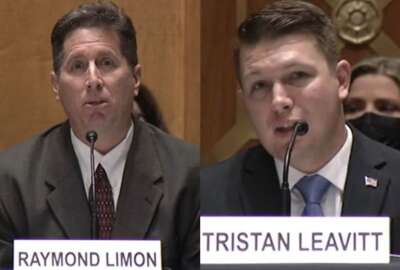Senior federal employees also have reason to be glad the Merit Systems Protection Board is back in business
The Senior Executives Association, which represents the government's highest ranking career officials, is especially glad the Merit Systems Protection Board has a...
Best listening experience is on Chrome, Firefox or Safari. Subscribe to Federal Drive’s daily audio interviews on Apple Podcasts or PodcastOne.
The Senior Executives Association, which represents the government’s highest ranking career officials, is especially glad the Merit Systems Protection Board has a quorum of two members. The Senate confirmed them a couple of weeks ago, ending five years without a quorum. The Association’s director of policy and outreach, Jason Briefel told the Federal Drive with Tom Temin more.
Interview transcript:
Tom Temin: Jason, let me ask you this. Is this a tempest in a teapot? Or does this small, obscure board actually have some sort of gravitational effect on the proper operation and efficiency of the government do you think?
Jason Briefel: Well, I think it’s the ladder, the MSPB is the core of the merit system. It’s a central part of these different agencies, including the Office of Personnel Management, the Federal Labor Relations Authority, the Office of Special Counsel, that helped make sure that the government treats its employees properly, that the government follows the law and the rules on its own workforce. And the MSPB is the agency that makes sure that the government treats its employees right. Because the government that treats its employees right and follows the law is a government that treats its citizens right. And that’s why these protections are in place in the first place. That’s why we have a merit system in this country and decided that that was so important for our democracy way back in the late 1800s.
Tom Temin: And there’s also an important issue, I think, maybe hasn’t been as discussed as much. But for the five years that there has not been a board or only one member, Mark Robbins was there for a couple of years, the administrative judges are operating pretty much on their own. And just from an internal sense, do you think a board can be kind of a governor on that engine?
Jason Briefel: Absolutely Tom, it’s a really critical issue, and one that I think is underappreciated. Administrative judges need supervision, they need that leadership. And they need that leadership from Senate confirmed officials that the president has nominated and have gone through that vetting process. I know that our friends over at the Government Accountability Project have documented that whistleblower decisions in front of AJs have not been going so well in these past five years. And we think that having a board in place to oversee and remind those AJs of the things that they need to be paying attention to is absolutely critical to the vetting process and the adjudicative process.
Tom Temin: Because if you look across government, lots of agencies for different missions have administrative judges or administrative law judges, as the case might be. And some of the case loads of those groups are orders of magnitude larger than what is faced by the MSPB. But in all cases, there is that element of rolling the dice with respect to which judge you’re going to get. And that’s one of the challenges, I think across government is consistency in how administrative judges and ALJ’s go about their work. So I would think that the board would be crucial in that process.
Jason Briefel: Absolutely. Like I said, setting the standards, maintaining those standards, communicating that out to those folks who are deciding at that first level, that administrative judge or the administrative law judge. And you know, as a matter of our constitutional system, having the Senate confirmed officials, the board members in the case of the MSPB, overseeing and being that next level of review, if someone wants to appeal the decision, hey, I don’t like what this individual AJ thought, I want to take it to a full board and have my chance there. These are rights and process that Congress enshrined into law for a reason.
Tom Temin: And one of the questions is, you know, how they’ll dispose of that 3,600, or whatever it is, case backlog of appeals of the judges that the board itself will have to decide on. And one way suggested is we’ll take the most cut and dried cases first. And maybe you could give us an example of what might be a cut and dried case of an adverse action, like someone brought a gun to work and shot a hole in the ceiling? Or is it more subtle than that, and what might be a more difficult type of case,?
Jason Briefel: The two new board members walking into the situation, they have the benefit of the first level staff analysis in these case files. So they’re not going to be walking in blind, but it is their job as board members to take the time to make the decision on their own. And so I would imagine and we heard in testimony when the nominees were before the committee from Tristan Leavitt, who has been working there as the chief administrative officer of the agency in his role as the general counsel, that prep work has been done. And so I think we can expect that there are cases that are those cut and dry, slammed dunk, something clearly happened here and someone clearly was wronged. And we need to reverse this right away and we can review this file and we can agree with that initial staff counsel review. Other cases that may be much more meaty, they’re gonna acquire more work. They may affect consequential and precedential matters of law. Maybe they’re going to wait until that there’s a full complement of three board members to address those wavier issues.
Tom Temin: Is there an example that comes to mind of something in the past that was precedential? That is not presidential like the White House, but setting a precedent that the board had to deal with?
Jason Briefel: So obviously, without a quorum these past years, these kinds of decisions haven’t been made in some time. But what we have seen is in the federal courts more broadly, for example, cases related to the implementation of the new VA accountability laws, and some of those cases have been sent back on remand into the MSPB, because it was found that processes or protocols might not have been followed properly. So I do think that we might see some further maturation on some of these issues, where Congress has been tinkering with civil service reform laws in usually focused on a specific agency that a full board may be able to weigh in on, and in which the higher level courts sent back for their review, and when a board could tackle that.
Tom Temin: So those could be lurking in that list of 3,600, whereas others would be someone carrying cash out of the office safe and trying to take it down to their car.
Jason Briefel: Absolutely.
Tom Temin: We’re speaking with Jason Briefel. He is the director of policy and outreach for the Senior Executives Association. And talking about the SEA itself, I mean, some of the SEA members are the ones that are likely to be before the board, because it’s not the union bargaining unit members that go to the MSPB. They’ve got their forum over at the Federal Labor Relations Authority. So it’s people SEA bound, or in the SES that are most affected here?
Jason Briefel: Absolutely, Tom, that’s so true. And it’s a really important distinction, that this is the forum for primarily all nine bargaining unit employees in the federal government. This is the place that Congress designed for them to enforce their rights. And that’s why it’s been a top priority for the Senior Executives Association to restore a quorum, so that agencies can benefit from the finality of the decisions that they put forward. You know, agency actions are held up 80+% of the time at the MSPB. But in those 15%, 16% of cases where the agency got it wrong, you know, that employee deserves relief, too. And that’s why the board is there to create a record and to adjudicate this. And it was frankly, very dispiriting and discouraging to have this lack of quorum go on for so long, and to see the Senate appear so dismissive of the consequences for what it meant for our government and the employees who work for it.
Tom Temin: What do you think took them so long? Because those people were, there were appointees during the Trump administration, and that never got acted on it took well over a year into the Biden administration to get it together. What do you think caused the Senate to act now?
Jason Briefel: It’s hard to say, you know, my guess is the civil service isn’t really much of a priority for Congress. I don’t think that that would necessarily surprise listeners of this station to hear very much. And then politics, you know, where does this issue fall into the power struggles and battles over how to use the Senate calendar and move nominees through that’s ongoing between Leader McConnell and Leader Schumer. And so when you put those things together, how important is this to an administration, how important this is to Congress, what other issues are on Congress’ plate or particularly the Senate’s plate? It’s kind of just fallen down. And I think that there’s a lack of appreciation in Congress of what this means. Because now that we do have a board back up and running, cases are going to start moving and stuff’s gonna happen. That’s going to have implication on the time of employees working in agencies. And in some of these cases, when an employee was wronged and might be put back to work, some agencies are going to be cutting huge checks for back pay and potential attorney’s fees, in some cases that might move through, and whether or not Congress connected the dots between their inaction on these nominees and budget implications that may affect the agencies that they care about and oversee later. I doubt it, I highly doubt it.
Tom Temin: But if the ratios hold, about 2,900 of those 3,600 cases that are pending will be disappointed.
Jason Briefel: Yeah. And again, that means the system is working, at least those people had an opportunity to have their kind of justice weigh in on their issue, and an impartial board that’s designed to adjudicate these matters, and give them their day in court. That’s what these 3,600 people have been deprived of for all of this time.
Tom Temin:
Jason Briefel is director of policy and outreach at the Senior Executives Association. Thanks so much for joining me.Jason Briefel: Thanks for having me, Tom, and thanks for covering this important issue.
Copyright © 2025 Federal News Network. All rights reserved. This website is not intended for users located within the European Economic Area.
Tom Temin is host of the Federal Drive and has been providing insight on federal technology and management issues for more than 30 years.
Follow @tteminWFED





